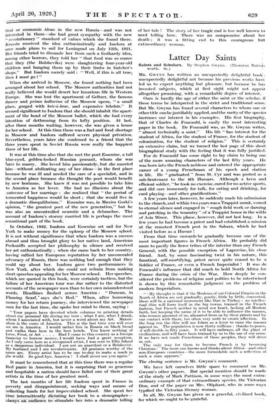Latter Day Saints
Mn. Gw'vxx has written an unexpectedly delightful book unexpectedly delightful net because his previous works have led us to expect anything but pleasure, but because he his invested subjects,. which at first sight might not appear altogether promising, with a remarkable degree of interest..
Ours is hardly the age of either the saint or the scholar, if those terms be interpreted in the strict and traditional sense. But Mr. Gwynn has found several characters to whom one or other title can be justifiably applied, and the rarity of the species increases our interest in his examples. His first biography, that of Charles de Foucauld, is easily the most interesting paper in the book. De Foucauld was, as Mr. Gwynn writes, " almost technically a saint." His life " has interest for the student of Africa, for the student of France, for the student of colonization, for the student of religion." This is certainly an extensive claim, but we turned the last page of this short biographical study with the feeling that it was fully justified.
For de Foucauld has some right to lay claim to being one of the more amazing characters of the last fifty years. He was born into the French noblesse and entered the appropriate career of a young Frenchman of his epoch and station in life. He graduated " from St. Cyr and was posted as a sub-lieutenant to the 4th Hussars. Although a keen and efficient soldier, "he took no exercise, cared for no active sport, and did care immensely for talk, for eating and drinking, for card playing—and other gratifications."
A few years later, however, he suddenly made his submission to the church, and within two years wasa Trappist monk, vowed to eternal silence and engaged in " rough field work or darning and patching in the tenantry" of a Trappist house in the wilds of Asia Minor. This phase, however, did not last long. In a few years he had become a priest and had established a mission at the remotest French post in the Sahara, which he had visited before as a Hussar !
From that time onwards he gradually became one of the most important figures in French Africa. He probably did more to pacify the fierce tribes of the interior than any French General, with the possible exception of Laperrine, his close friend. And, by some fascinating twist in his nature, this fanatical, self-mortifying, priest never quite ceased to be a Soldier of France, or even a French Imperialist ! It was de Foucauld's influence that did much to hold North Africa for France during the crisis of the War. How deeply he con- sidered the problems of religion and politics to be intertwined is shown by this remarkable judgment on the problem of modern Imperialism.
" • My thought is that if the Moslems of our Colonial Empire in the North of Africa are not gradually, gently, little by little, converted, there will be a national movement like that in Turkey : an intellec- tual elite will form itself in the big towns, trained in the French fashion, but French neither in mind nor heart, lacking all Moslem faith, but keeping the name of it to be able to influence the masses, who remain ignorant of us, alienated from us by their priests and by our contact with them, too often very unfit to create affection. In the long run the elite will use Islam as a lover to raise the masses against us. The population is now thirty millions : thanks to peace, it will double in fifty years. It will have railways, all the plant of civilization, and will have been trained by us to the use of our arms. If we have not made Frenchmen of these peoples, they will drive us out.
The only way for them to become French is by becoming Christian.' The more one knows and thinks about Africa—and other non-European countries--the more formidable such a reflection of such a man appears."
The closing sentence is Mr. Gwynn's comment.
We have left ourselves little space to comment on Mr. Gwynn's other papers. But special mention should be made of the study of Mark Pattison, in some ways the most extra- ordinary example of that extraordinary species, the Victorian Don, and of the paper on Mrs. Oliphant, who in some ways typified the Victorian literary woman.
In all, Mr. Gwynn has given us a graceful, civilized book, -for which we ought- to he-grateful.
























































 Previous page
Previous page